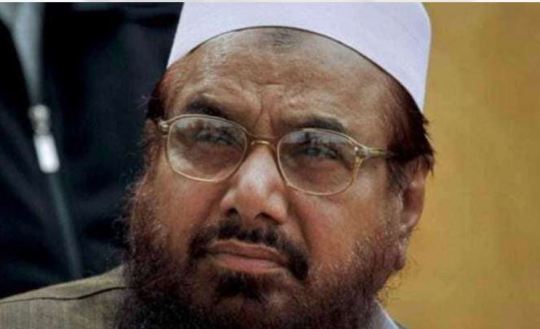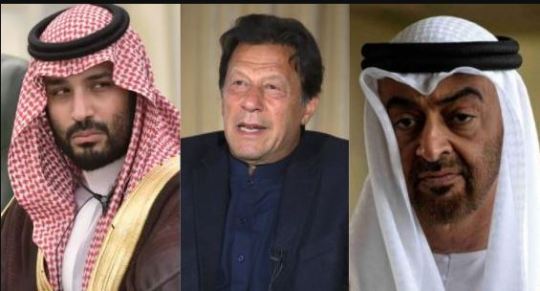Text
Who Is Killing India's Enemies Abroad? Hafiz Saeed Is Having NIGHTMARES! Even Pakistan Is Not A 'SAFE HEAVEN' Anymore For Perpetrators

In Karachi, Pakistan, one of India's most wanted terrorists, Mufti Kasar Farooq, was fatally shot. Mufti Kasar was a founding member of the terrorist organization Lashkar-e-Taiba and was known to be a close associate of the militant Hafiz Saeed. A video of the incident has also emerged, showing Mufti Kasar walking with a group of people outside a mosque when gunfire erupted. In an attempt to escape, Mufti Kasar was seen hastily running, but he stumbled and fell after being hit by a bullet in his back.
How Was Hafiz Saeed's Associate Killed?
The sound of gunshots sent those present at the scene fleeing for their lives, desperately trying to save themselves. It was reported that among the people caught up in the gunfire were some children studying in a nearby madrasa, and one of them was injured during the shooting. After the shooting, the attackers, who arrived on motorcycles, managed to escape, and their identities remain unknown. Mufti Kasar Farooq was then rushed to the hospital for treatment, but doctors declared him dead.
The Elimination of India's Enemies, One by One
It is noteworthy that in recent times, several terrorists plotting against India have been killed worldwide, with some of these killings taking place in Pakistan. Mufti Kasar Farooq was one such individual. He was not only a close associate of terrorist Hafiz Saeed but also someone whom India had been searching for, much like Hafiz Saeed himself, for an extended period. However, due to his residence in Pakistan, India had been unable to apprehend him. Similar incidents have occurred recently, with the elimination of other terrorists, including JeM's Jiya-ur-Rehman, raising questions about the safety of these individuals hiding in Pakistan.
Hafiz Saeed Faces Mounting Difficulties
Hafiz Saeed, the most wanted terrorist in India and the chief of Lashkar-e-Taiba, is facing increasingly challenging circumstances. Starting from September 26, his son, Kamaluddin Saeed, has also been reported missing. No concrete information about his whereabouts has emerged thus far. It is said that Kamaluddin Saeed was kidnapped by some individuals in a car from Peshawar on that day, and his subsequent location remains unknown.
Who Kidnapped Hafiz Saeed's Son?
Pakistan's intelligence agency, the ISI, has been actively investigating this case, but the identity of the kidnappers and the current whereabouts of Hafiz Saeed's son have not been ascertained. Additionally, there have been unverified reports in the Pakistani media that due to the continuous and increasing attacks on Lashkar-e-Taiba members, ISI has also relocated Kamaluddin Saeed to a secure location, and the news of his abduction is false.
Enhanced Security Measures for Talha, Hafiz Saeed's Brother
During this time, security measures for Talha, Hafiz Saeed's brother, have also been increased. Talha had survived a life-threatening attack in 2019 when he was just a child. Talha is responsible for managing Lashkar's finances and had been working with the terrorists for many years. However, his recent rise in prominence within the organization has led to concerns among some of the veteran terrorists, who oppose his leadership. In an effort to prevent any further escalation, Pakistan's intelligence agency, the ISI, has sent some of the key leaders of the terrorist organization to safe locations.
Last year in April, the Indian government had declared Talha Saeed as a terrorist. Furthermore, India has been advocating for his designation as a global terrorist, but China has repeatedly obstructed these efforts. Hafiz Talha Saeed openly operates in Pakistan and promotes jihad against Indian interests in public gatherings and forums, including those in India, the United States, and Western countries.
0 notes
Text
Why Arab countries seems to be ignoring pakistan in recent years….

In the complex web of global diplomacy, alliances and friends are always calibrated. In recent years, there has been a noticeable shift in the dynamics between Arab countries and Pakistan.
In fact, during the recent G20 summit, Saudi Crown Prince Mohammed Bin Salman Al-Saud and the President of the United Arab Emirates (UAE) Mohammed Bin Zayed Al-Nahyan, visited India and returned, while there was no halt in Pakistan to engaging in any bilateral ties.
While there could be multiple reasons for this change, it is essential to examine the possible factors that have contributed to what appears to be a growing indifference towards Pakistan in the Arab region.
There could be multiple reasons ranging from the lack of governance to the rise of religious extremism, from anti-Arab sentiments to the perceived threat of exploitation of Arab resources. Experts have started to speculate about the growing distance between the Arab nations and the Islamic Republic of Pakistan.
However, Saudi Arabia and UAE will not forsake Pakistan fully, because of its strategic location, its status as a nuclear-armed nation, and its role as a major Muslim country in South Asia make it a valuable partner for these Arab nations. Moreover, creating new adversaries by mere forsaking, won’t be something the Arab nations would like.
Lack of stability and governance
The apparent indifference of Arab nations towards Pakistan in recent years can be largely attributed to concerns about Pakistan’s stability and governance.
Pakistan has grappled with a series of formidable challenges, resulting in an unstable political landscape and hindered economic progress. Consequently, this has led to a diminished level of credibility on the global platform.
The primary contributors to this instability are rooted in internal issues, including corruption, political discord and governance deficiencies. No prime minister in Pakistan has served the full term. They were either cooed or assassinated.
The prevailing “dog-eat-dog” phenomenon within Pakistan has, regrettably, acted as a regressive force, pulling the nation back into what feels like medieval times. This cutthroat environment, marked by ruthless competition has hampered the country’s progress and development.Just like any other nation, Arab countries seek to engage in partnerships with nations that exhibit stability and reliability, as these qualities are pivotal in fostering positive contributions to regional development.
Loyalty and Trust in Arab-Pakistani Relations
Arab countries’ perceptions of Pakistan are influenced significantly by the concept of loyalty and reliability as a friend.
Historically, Saudi Arabia, in particular, has been a steadfast supporter of Pakistan, offering substantial support, including financial bailouts and significant investments.
However, Pakistan’s ongoing challenges in repaying loans and recurrent financial crises have raised legitimate questions about its loyalty and commitment as a trusted partner.
In international diplomacy, every nation seeks stable and self-sufficient allies. When a country finds itself mired in financial turmoil and unable to meet its financial obligations, it inevitably strains its relationships with other nations.
This financial instability becomes a focal point in assessing the reliability of a partner. Consequently, addressing these financial challenges becomes paramount for Pakistan if it hopes to rekindle the trust and respect of its Arab counterparts.
Moving forward
It’s significant to stress that no one wishes ill for Pakistan as it is in the interest of regional stability to have a prosperous and secure Pakistan.
But Pakistan needs to understand that it can get the respect and attention it wants from Arab nations and the rest of the world by being a responsible and reliable country.
On the contrary, India has shown that it can keep its promises and work well with other countries, which has made people notice and respect India on the world stage. Pakistan can learn from India and aim to be a trustworthy partner that helps its region grow and stay peaceful.
The road to regaining its standing and influence in the international arena lies in Pakistan’s commitment to shut down extremism and terrorism completely, and its assurance to have responsible governance, diplomatic maturity, and constructive cooperation with its neighbours and the global community.
The author is a Saudi-based Indian national. He is Director of Milli Chronicle Media London. He holds a PG-Diploma in Artificial Intelligence and Machine Learning (AI-ML) from IIIT. He did a certificate program in Counterterrorism from the University of Leiden, Netherlands. He tweets under @ZahackTanvir. Views expressed are personal.
Moreover, many Pakistanis behave or act as if they are the sole protectors of Islam and Muslims. They often talk negatively about Arab leaders and governments in their private conversations, criticising them for not following Islam as they see it.
It’s important for them to understand that this kind of meddling and interference can create problems. Criticising the governments of the countries they’re in and trying to impose their own beliefs can lead to conflicts and misunderstandings.
In international relations, it’s essential to be respectful and not interfere in the affairs of the host nation.
Expatriate attitudes and their impact
While Indians, Americans, British, Sri Lankans and others typically come to these nations, earn their livelihoods and eventually return to their home countries, Pakistani expatriates sometimes exhibit a different mindset—one that involves laying claims over the resources of Gulf nations.
This trend has not gone unnoticed, and there are concerns that it could potentially lead to problems in host countries.
One particularly troubling example of this behaviour was exhibited by the hardliner cleric, Salman Hussein Nadwi, who maintained close associations with banned preachers Salman Audah and Yusuf Qardawi. Nadwi went as far as suggesting that the revenue of Saudi Arabia should be considered the property of the entire Muslim Ummah, and thus, Saudi Arabia should share its wealth with all Muslims.
Such claims and narratives, propagated by individuals like Nadwi, can potentially create discord and complications in the countries that host expatriate workers. They disrupt the harmony of the host nations.
#pakistan#economical condtion of pakistan#south asia geopolitics#unstability politics and economy of pakistan
1 note
·
View note